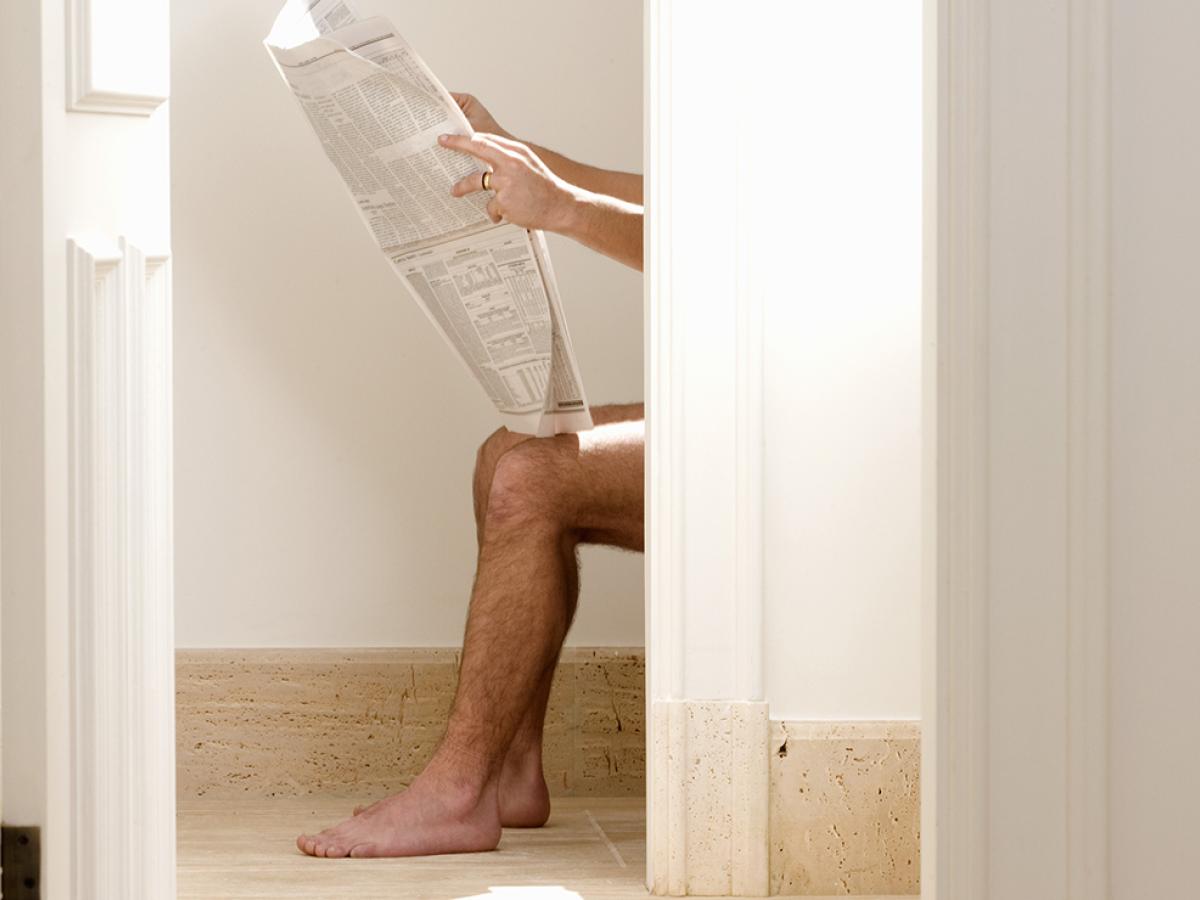March 20, 2023

No one wants to discuss going “number two” or the body parts involved. But with cases of colorectal cancer increasing for people under 50, we thought it might be time to get the conversation going.

In keeping with our “I’d Never” series, we turned to MU Health Care colorectal surgeon Erik Grossmann, MD, to find out how to keep our hind parts healthy. Reflecting on his 25+ years of experience caring for patients with intestinal issues, here are the five things Dr. Grossmann says you should NEVER do:
1. Never Spend More Than Five Minutes on the Toilet
You know the scenario: You’re in a rush. It’s been a while since you’ve gone. The bowel movement is just difficult to pass. For so many reasons, we strain to poop.
Bowel movements shouldn’t require physical exertion and straining, says Dr. Grossmann. If it happens occasionally, it’s okay. But straining regularly can cause health complications, including:
- Hemorrhoids: Everybody has hemorrhoids — swollen veins in your rectum and anus. But they aren’t always big enough to be a bother. They tend to get bigger as you age, and straining can cause hemorrhoids to flare up and develop sooner.
- Anal fissures: Physical exertion during a bowel movement can cause a tear in the lining of your anus. They aren’t usually a serious condition and typically heal in a few weeks. But they don’t feel good.
- Rectal prolapse: When you constantly strain the muscles that push poop out, you may push your rectum out of position, causing rectal prolapse.
“You don't have to have a bowel movement daily to be healthy. The normal range is anywhere from three bowel movements a day to one every three days,” Dr. Grossmann says. “Try for a couple of minutes. And if nothing's happening, get up and walk around. You may not really need to go to the bathroom.”
2. Never Skip the Recommended Amount of Fruits and Vegetables
The dietary guidelines for Americans advise eating two cups of fruit and three cups of vegetables daily. But only 1 in 10 adults meet those recommendations.
“There is increasing evidence that keeping the bacteria in our body happy is the key to good health,” Dr. Grossmann says. “And we keep the bacteria happy by eating lots of vegetables.”
Fruits and veggies offer an added benefit for people living with painful hemorrhoids. About 80% of people with troublesome hemorrhoids improve their symptoms and avoid surgery simply by eating enough fiber and drinking enough water. Produce contains both.
“Just find fruits and vegetables you like and eat a lot of them,” Dr. Grossmann says. “It’s that simple. Don’t worry about eating the latest and greatest superfood if it doesn’t taste good.”
3. Never Dismiss Any Blood You See Down There
Up to 34% of people experience rectal bleeding at some point. You may see blood in the toilet, your stool or toilet paper when you wipe. Often, it’s a minor symptom of an easily treated condition, but it could also be a sign of something more serious.
Some common causes of rectal bleeding include:
- Diverticulitis: Infected or inflamed pouches in the colon
- Fissures: Tears in the anus, colon or rectum
- Fistulas: Abnormal openings that develop between the anus and rectum or anus and skin
- Hemorrhoids: Inflamed anal blood vessels
- Polyps: Noncancerous, abnormal growth in the rectum or colon
- Proctitis or colitis: Inflamed tissue lining the rectum or colon
- Rectal or colon cancer: Cancer that can develop from polyps
Assuming rectal bleeding is minor may be a mistake, says Dr. Grossmann. “Even folks under 50 can have colon tumors and colon polyps. You should discuss rectal bleeding of any kind with your doctor.”
4. Never Drink Less Than Eight Cups of Water a Day
Staying hydrated is vital to a healthy colon. It flushes out toxins and waste from your body. And it can help you avoid constipation — less need to strain on the toilet.
Most people subscribe to the rule of eight: drink eight 8-ounce glasses (64 total ounces) of water daily. But Dr. Grossmann says that’s the minimum amount of water for a healthy colon.
The U.S. National Academies of Sciences, Engineering and Medicine determined that to be adequately hydrated, men need 125 ounces of water daily, and women need 91 ounces. But if you’re counting coffee or tea in your water intake, you get less water than you think.
“The chemicals in coffee and tea will cause you to urinate a lot of that water back out,” Dr. Grossmann says. “So if you drink a cup of coffee, you don't actually get a cup of water.”
5. Never Put Off Colorectal Cancer Screening
The U.S. Preventive Services Task Force recently lowered their recommended starting age for colorectal cancer screening to 45. “We’re seeing less colon cancer in every other age group except people under 50,” Dr. Grossmann says. “Getting screened for colorectal cancer can make a difference for that age group.
Several screening tests are available for colorectal cancer, including:
- Colonoscopy: Doctors use a long, lighted tube to check the entire rectum and colon or polyps or cancer. If they find any, they can typically remove them during the procedure.
- Stool tests: You collect a stool sample at home, and a lab tests it for blood or altered DNA. The results may indicate that you need a follow-up colonoscopy.
- Flexible sigmoidoscopy: Your doctor uses a thin, lighted tube — just like a colonoscopy — to check only the lower third of the colon.
- CT colonography: Doctors use X-ray images of the entire colon to look for polys and cancer.
The type of cancer screening you should choose can depend on your risk for cancer, medical condition, family history and preferences.
“There are some things that put you at high risk, and you may not realize it,” Dr. Grossmann says. “That’s why you need to discuss colorectal screening with your doctor and do it as soon as possible.”
Next Steps and Useful Resources
- Want to learn more about cancer screening? See the latest recommendations.
- Missed other installments of our “I’d Never” series? Check out: 7 Things I’d Never Do — Advice From a Urologist


